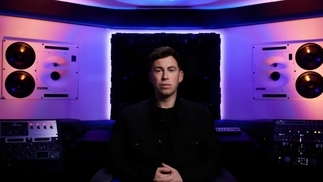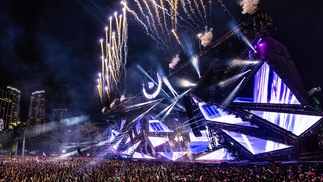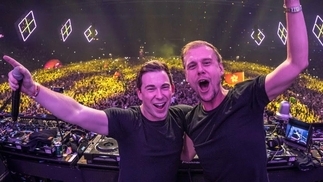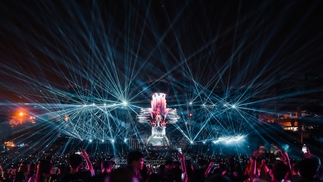MUSIC PIRACY: DIGITAL SKULLDUGGERY!
DJ Mag investigates the cynical money-making practice of digital music piracy...
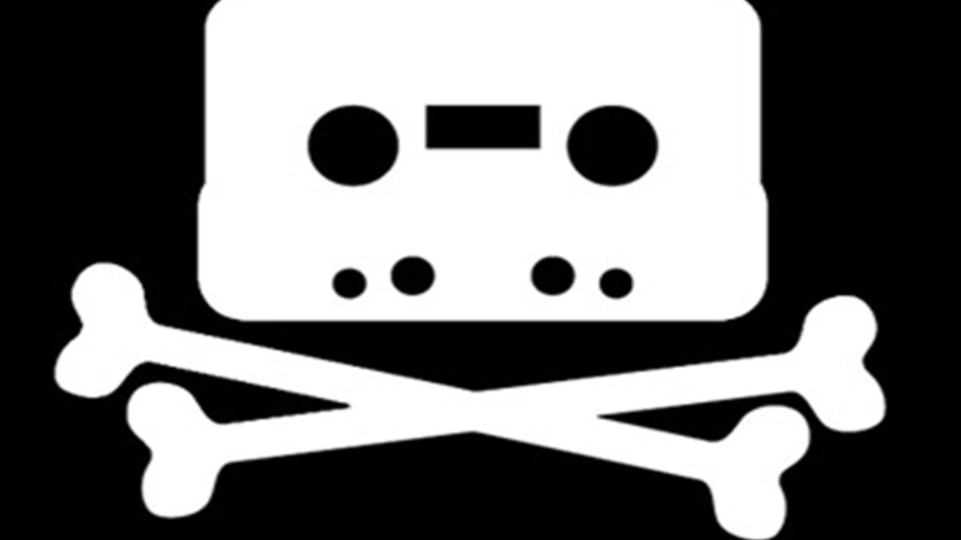
Music piracy used to be a bit of home-taping of the Top 40 chart off the radio, or some guys selling illegal live bootleg tapes of rave sets or U2 gigs or whatever — but since the advent of the internet, the game has changed. Now it’s a global concern.
The internet has allowed new DJ/producers to spread their sound internationally at the touch of a button. Dubstep got so big relatively quickly because of the internet.
People can now get music in just one or two minutes from anywhere in the world. So although this is a great opportunity for new emerging artists, it’s also meant that unscrupulous people can exploit their work. Welcome to the world of commercial music piracy.
While home-taping usually just meant making a low quality copy for yourself or friends or a lover, internet-based piracy is big business. Artists are often under the illusion that piracy is fans sharing their favourite tracks with their friends, which will further boost the artist’s fanbase. This common misconception couldn't be further from the truth.
The mechanics are simple; a pirate obtains a file that others want. In theory, this can be anything but to be a successful pirate you want to find yourself the latest hot new release — ideally before it is available to buy. Let’s, for the sake of argument, say that it’s Hardwell’s new single. The pirate then uploads Hardwell’s track to a cyber-locker, which gives them a link that allows anyone who clicks it to download the file.

With a little distribution of the link to various forums and social media sites, the pirate can quickly get over 1000 downloads of the file — and a nice kickback from the cyber-locker of up to 50 Euros.
Not bad for probably less than 30 minutes of work. In turn, the cyber-locker makes money through showing adverts to the users who are downloading the file containing the Hardwell track, or by encouraging them to sign up for a premium package allowing faster and unlimited downloads of the latest pirated releases.
It gets worse. The pirate soon tires of doing this manually, and after a crash-course in web programming they build themselves a simple system to do the generation and distribution of links automatically.
This rapidly speeds up the rate of income for the pirate. These programs often don’t discriminate and will frequently pick up new releases from young, emerging artists trying to create a career for themselves in the music industry, as well as releases from existing big artists and labels. Artists like Hardwell, for instance, who started off small only a few years ago.
Quite often, when a new release comes out, if you search for it in Google the first page will show a link to Beatport — and then a whole load of illegal download sites. Google could undoubtedly do more to push down known pirate sites like ZippyShare and HulkShare in its search results, but because it positions itself as a meritocracy, search results appear in order of relevance relating to the search terms, regardless of content.
Google has been challenged on this repeatedly by music trade bodies such as the British Phonographic Industry (BPI), who have also campaigned for the government to adopt a tougher stance against music piracy. So far, though, the UK government has been reluctant to apply pressure to search engines like Google to change the way it lists or gives access to pirate sites — probably because of the company’s economic power and influence. It also scarcely challenges persistent illegal downloaders with anything other than a letter.
There are many well-known sites distributing pirated music that attract big audiences and continually publish new releases. A good example is Newablumreleases.net.
If we assume Newablumreleases.net receives just 100,000 visitors per day and those visitors each download one track, the payout from cyber-lockers alone could easily be 5000 Euros per day! This is five thousand Euros that is being taken out of the music industry and into the pockets of unscrupulous pirates — who probably don’t give a toss about music.
The whole music industry has been turned on its head in the last decade or so — with music sales falling through the floor, most income for a DJ/producer now comes from gigs. Piracy is so bad now that many labels use their releases simply as a loss leader to help market their artists for live gigs. So it’s ironic that many of the fans who happily pay to see these artists perform will equally think nothing of downloading their songs via pirate sites for free. Thus, the pirate site gets the money and the artist and label who worked so hard to make it get nothing.
However, labels can do something to combat piracy. They can contact an anti-piracy company and possibly see sales rise by 25%. For a lot of labels and releases, these extra sales can often be the difference between making a profit and a loss. Hardwell himself credits signing up to an anti-piracy company as playing a part in having big Beatport chart-toppers coming from his label, Revealed.
Producers spend a lot of time learning their craft and then making music to be played in clubs. If the producer isn’t really going to get directly paid, then the music and the scene is going to suffer — as are the labels. “The music we put out over both Metalheadz and Dispatch is the result of lots of hard work from all involved, dedication and an amazing amount of creativeness from each and every artist we sign,” says Metalheadz label manager Ant TC1.
“We believe because of this, both for the benefit of ourselves as an independent label and on behalf of our artists, that it’s our place to make every effort to ensure that all of the hard work is rewarded and that people’s work is protected against piracy.
“It would be great if all this music in the world was free,” Ant continues, “but in reality to do what we do takes time, effort and a lot of work. “Eventually — and I have seen this — artists and labels are left wondering how they can continue to dedicate so much time to the studio and dance music in general when the returns are low and people struggle to pay bills.”
Goldie’s label Metalheadz is one of hundreds of independent labels signed up to an anti-piracy company. “We truly believe that those who love, appreciate and support what we do as a label see no problem in paying the small return we ask for our music in its digital format,” says Ant. “Whilst we continue to push forward and focus on putting out the very best music, we can then rest assured that our music is protected from those that think it's OK to steal it for free.
So how do the pirates get hold of new releases? Most labels have a mailing list, sending out promos in advance to generate hype and buzz, and it only takes one DJ or journalist on the list to leak the track and it’s out there in cyberspace. In a few cases, promos can even be leaked by a member of staff working at the label or at a pressing plant.
They pass the track to what are known as ‘release groups’, who then distribute it through the internet using networks such as the IRC, which was originally used for online chat. Once in this network, it can be seconds before it is on several sites.
Each site can then feed other sites and so on. Omid 16B recently suggested that labels abandon mailing lists altogether, so that even big-name DJs have to buy the tracks they’re playing at their megabucks-earning gigs.
Illegal download sites can make big money, and often they look legitimate to the point that labels — even well-known ones — are often seen accidentally promoting their releases as being available in legitimate download stores, but are instead listing a pirate site amongst these.
But a lot of people illegally download something at first and then buy it later, don’t they? No, research shows that most actually don’t. They may engage in other ways (on social media or whatever), but if a fan likes an artist’s work and wishes for them to continue to produce, then they should help support the artist — and this is definitely not done by downloading from a cyber-locker.
So who are these anti-piracy companies, and what do they do? Web Sheriff, Rip Block, Link Busters, Topple Track and Muso are some of the main ones, but perhaps the premier company when it comes to dance music is AudioLock, set up by Ben Rush — an ex-DJ. Anjunabeats, Armada, Axtone, CR2, Defected, Critical, Fabric, Hospital, Hyperdub, Ninja, New State, OWSLA, Ram, Skint, Southern Fried, Spinnin’, Sunday Best, Toolroom and Warp are just some of the independent labels signed up with AudioLock.
“AudioLock is a bit like the security that private citizens and companies use to protect their property,” Ben tells DJ Mag.
“AudioLock has nothing to do with the police or government. Artists and labels employ AudioLock’s services to protect the music they work so hard to make. Our automated anti-piracy service simply finds and removes infringing links to our clients’ music from right across the internet including cyberlockers, direct sites, torrent sites, usenet, SoundCloud, YouTube, Dailymotion, Grooveshark, click scam sites, search engines (including Google and Bing), file search engines, VK, Facebook, Twitter and other social media sites.”
Phew! How do they do this? “By removing these infringing links, our clients’ official download site links gain greater exposure and have less piracy to compete against,” Ben explains. “The service was intentionally built from the very start by music lovers to be as automated as possible, and scalable — to make it affordable — so that every artist and label, no matter how big or small, can protect the music they work so hard to make.”
AudioLock removes infringing music content from more domains (sites offering pirated music or links to it) than any other music specific anti-piracy service, apparently — according to Google.
Some pirates would like you to think that they’re just anti-copyright freedom fighters, daring outlaws who are defying authority in order to bring free music to the people. But this isn’t a case of Robin Hood robbing the rich to feed the poor.
The majority of pirates are simply out to make money for themselves — as Judge Jules, the trance DJ and now music industry lawyer who takes a keen interest in music piracy, points out (see box out).
In the '90s and early noughties, dance music fans did not steal vinyl from record shops en masse because it was too expensive. They simply bought less and treasured what they had more. If anything, the digital realm allows greater targeted selection, so a DJ may only buy one track from a new EP digitally, instead of having to buy the whole piece of vinyl for seven or eight pounds.
A new track on Beatport costs one or two pounds max.
When you buy from a legal download site, a significant percentage of the money goes back to the producer. When you illegally download, the producer loses out. Pirates make money from other people’s hard work to better themselves, not the music industry or fans. You can bet that anyone claiming pirates are sharing music for the betterment of the wider dance music community probably doesn’t pay for music themselves.
So can the pirates ever be completely defeated? Can the industry give them the ‘black spot’? Only if attitudes change at a consumer level. “Music piracy is one of the only forms of criminal activity where it is still seen as being socially acceptable to discuss down the pub,” says Ben Rush. “For change to happen, this attitude needs to shift.
Essentially a big part of the cause of piracy is simply a question of supply and demand. If the demand for stolen music dwindles, then the pirates will move onto other media or criminal activities.”
Most of us have probably done it at some point. Not able to find an old or quirky track to play, we’ve easily found an illegal download site and acquired the track that way.
Some people, though, obtain their entire music collections in this manner. Now is the time for this practice to end. We have more amazing music being produced now than ever before, but think what more could be made if there was more money for existing labels to grow their talent, or new artists just starting out to quit their job at the supermarket and work full-time in the studio. So when you next hear a friend or colleague saying they illegally downloaded something, challenge them on it. Music makers must be supported, not the pirates.
WHAT CAN LABELS DO ABOUT PIRACY?
* Check and re-check promo lists. It’s better to send to a small well-chosen number of people and to develop relationships with them than to send to hundreds of people.
* When posting previews on streaming sites like SoundCloud and YouTube, ensure they only use short previews and mark them as such by adding to the title of the preview — eg, ‘SHORT PREVIEW’.
* Don’t leave it too long before you make the release available to buy.
* If there is budget, send watermarked promos and use an automated anti-piracy service.
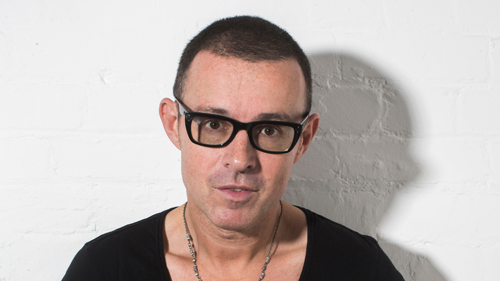
JUDGE JULES ON MUSIC PIRACY
“Like many artists, I viewed illegal downloads of my music as being a by-product of popularity, done by fans. I naively believed that file-sharing still helped me as an artist and spread my musical message. Little did I know that file-sharing and illegal downloads are large-scale organised crime, perpetrated not by bedroom fans but by file-scraping automated sites that steal artists’ music without a care in the world about me or any other music maker.”
